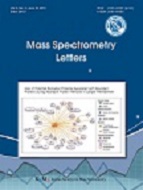
- P-ISSN 2233-4203
- E-ISSN 2093-8950

The Brazil nut (Bertholletia excelsa - Lecythidaceae) is considered a product with high economic value, being a food widely appreciated for its nutritional qualities. Although previous studies have reported the biochemical composition of Brazil nut oil, the knowledge regarding the phospholipid composition exhibits a disagreement: the composition of fatty acids present in the structures of phospholipids is reported as being different from the composition of the free fatty acids present in the oil. In this work, solid phase extraction (SPE) was employed to provide a fast extraction of the phospholipids from Brazil nuts, in order to compare the phospholipid profile of the in nature nuts and their fatty acids precursor present in the oil. The major phospholipids were characterized by mass spectrometry approach. Their fragmentation pattern through direct infusion electrospray ionization ion-trap tandem mass spectrometry (ESI-IT-MS2) proved to be useful to unequivocal characterization of these substances. High resolution (HR) experiments through ESI using a quadruple time of flight mass spectrometry (QTOF) system were performed to reinforce the identifications.
Souza, J. M. L.. (2004). Manual de segurança e qualidade para a cultura da castanha-do-brasil. CampoPAS, Brasília, Distrito Federal, , 60-.
Scoles, R.. (2012). . Forest. Ecol. Manag, 265, 71-.
Yang, J.. (2009). . LWT - Food Science and Technology, 42, 1573-.
Chunhieng, T.. (2008). . J. Brazil. Chem. Soc, 19, 1374-.
Yan, X.. (2010). . Chinese Journal of Oceanology and Limnology, 28, 106-.
Lee, S. J.. (2010). . J. Food Compos. Anal, 23, 314-.
Wang, X.. (2006). . Prog. Lipid Res, 45, 250-.
Herchi, W.. (2011). . Food Chem, 129, 437-.
Avalli, A.. (2005). . J. Chromatogr. A, 1071, 185-.
Barroso, B.. (2005). . J. Chromatogr. B, 814, 21-.
Li, Y. L.. (2005). . J. Am. Soc. Mass Spectr, 16, 679-.
John, J. A.. (2010). . J. Funct. Foods, 2, 196-.
Hammerstone, J. F.. (1999). . J. Agr. Food Chem, 47, 490-.
Hsu, F.. (2000). . J. Am. Soc. Mass Spectr, 11, 986-.